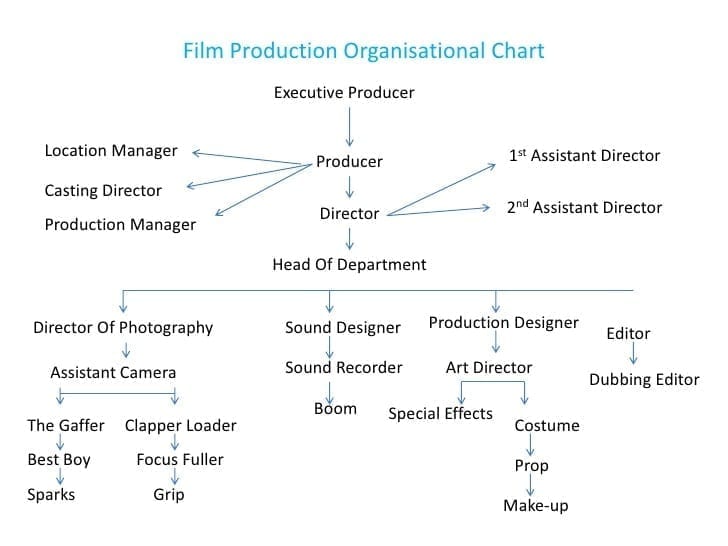How to Negotiate Film Crew Agreements and Contracts
You should always try to pay people’s day rates, but in indie film, sometimes you need to negotiate for the sake of the project and your vision. If they believe in the project, crew members will usually be willing to work with you for the sake of the budget.
Always compensate people fairly, but you can also negotiate within reason to make your production happen. Read on for some tips on how to negotiate so that everyone involved in your production wins.
Familiarize Yourself With Film Crew Jobs

Before you can start negotiating and hiring for potential film crew positions, you need to understand their positions and their basic role on set. For example, if you don’t know fully understand what the Director of Photography (DP, also called a cinematographer) does, you’ll be at a loss when he or she says they’ll need sufficient budget to hire a 1st AC (that’s first assistant camera).
If you understand the cinematographer’s job and the needs of everyone on your film crew list, you could use a negotiating tactic such as offering the DP a production assistant (PA) instead of an AC, which would be more expensive.
This PA could be one of your friends, a college student, or just someone who wants experience on set. Just explain that it’s a low-budget shoot, and ask the DP if a PA will be sufficient.
Nuances and producing strategies like this can really save a budget’s bottom line. This is just one example, and sometimes your production might really require an AC to make sure the shots are in focus. But it never hurts to explore cutting down on crew.
To get a general understanding of film crew hierarchy, study this film crew organizational chart below. It does get a bit more specific than this, but this chart should give you a good idea of film crew roles and department such as production design, set designers, boom operators, and the key grip, which is useful information when it comes time to hire film crew.

Learn the SAG Rates

The type of your production will play a crucial role in how you budget for your film, particularly if you want to hire union actors or crew. Actor rates–generally referred to as “day rates” or “pay rates”–differ depending on the type of production.
If you want to use actors from SAG (the Screen Actors’ Guild), you’ll need to adhere to their agreements, procedures, time sheets, and rates. The SAG Short Film Agreement and SAG Student Film Agreement minimum day rate is $125 per day, and there are many forms that will need to be completed as part of the film production agreement.
Where you plan on distributing your film can have an impact on the type of agreement you’ll need to follow, so be sure to check out SAG’s options at their website. Here’s a sample of their short film agreement, but to get a real form, you may need to create an account at their website.
SAG actors can be great, but you can also find amazing non-union talent if you need to save on production cost. If you want save money by doing your own casting instead of hiring a casting director, you can find actors on websites like Backstage.
Knowing if you need to pay union rates or not will allow you to adjust other line items in your budget accordingly.
Introduce Yourself and Your Background

Before throwing film contracts in your potential crew’s face, be sure to properly introduce yourself. Explain your background, your interest in filmmaking, what types of projects you like to work on, your working style, etc.
The more open you are with your crew, the more they’ll trust you. If you send someone a film production or film producer contract before meeting with them and giving them the details of your vision, they may just see it as a job. And if they see it as only a job, they likely won’t work with you on rates.
Share Your Script

You definitely need to share your script with potential crew members, especially if they’re department heads. Not only will they need the information contained in the script later on, but it shows that you trust them and are open to collaboration. No one wants to work with a director or producer who is overly secretive.
If you’re transparent with your potential crew from day one, you’ll have an easier time when it comes time to discuss the film production contract or deal memo with them.
Ask for Referrals

People like working with people they’ve worked with before. And they often work closely with the same people. Your sound recordist might know a great sound designer for post production. Your PA might know assistant directors, script supervisors, or even line producers.
Word of mouth and reputation helps when negotiating rates. If a crew member joins a crew she’s already familiar with, he or she may be more willing to adjust their rate because they know the shoot is legitimate, and they’ve worked with some of the people before.
Shop Around
While everyone you interview won’t be at the same skill level, it’s helpful to get a range of day rates in your area by actually speaking to crew. By interviewing multiple crew members for the same position, you may find someone with equal talent as someone else, but who doesn’t ask for as much money as someone else. This could be because they don’t have as much experience, or maybe they want a higher volume of work. Either way, make sure you pay your crew fairly.
Consider geography, too. NYC film crew rates may differ from rates in Atlanta or Los Angeles. Hire local whenever possible to avoid travel and lodging expenses, which can quickly add up.
Offer Your Crew a Percentage of the Project’s Earnings

If your planning on selling this film to a distributor, you can include terms in your crews’ agreements that guarantee them a percentage of the film’s profits.
Think of it like a startup contract from a company with limited funding: they may not be able to offer you a top competitive salary right at first, but they’ll compensate you with equity in the company to make up for it.
If you go this route, just be sure to consult an entertainment attorney who has experience drafting film crew contracts.
Offer Your Crew Rights to the Assets or Props

Similar to giving your crew a percentage of the film’s profits, you can also offer them rights to the assets they create during production. In a typical independent contractor agreement, the contractor (your crew member) does not have rights for the “work product” he or she creates during the agreement.
However, if you can’t afford to pay your crew member’s full rate, you can offer them rights to this work product. For example, you could create a license agreement so that your cinematographer can license the footage to then sub-license out as stock footage, therefore monetizing footage from your project. You could allow your sound designer or sound recordist to do the same with the audio files they create. If you’re working with a composer, make sure you use a film music contract. You can pick and use any music contract template from sites like UsefulPDF and start working with your composer without wasting any time and effort. Note, we are not attorneys, and this is not legal advice. Please consult an attorney for any legal needs.
You can do the same regarding props. If the production designer is looking to build their inventory of props or wardrobe, consider letting them keep items purchased for the production.
Offer Locations Free Advertising
While not technically crew, location owners are crucial to your film’s success if you’re shooting on location somewhere. And they can be expensive.
Whatever You Do, DO NOT Offer Deferred Pay

If you want your crew to trust and respect you, do not offer them deferred pay. It’s fine to offer them a percentage of the film’s profits, but do not solely offer them this. Always pay them a base.
Even if you genuinely do plan on paying them if the film’s profitable, that’s a big if. People work hard, and they need to be compensated for their work. Even with the best of intentions, it can come across as unprofessional.
Familiarize yourself with film crew hierarchy, respect your crew, and compensate them fairly. If you get creative, you can come up with an arrangement where you can complete your film under budget with everyone happy. Happy crew means they’ll want to work with you again, and building reputation in this industry is extremely important.